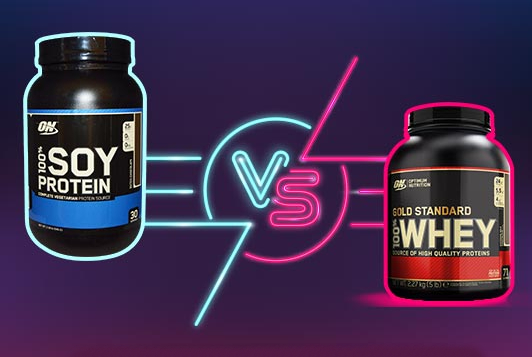Whey Protein and Soy Protein are two of the most common ways to get more protein, and people often argue about which is better. Choosing the correct protein source can have a big effect on your goals, whether you’re an athlete, a fitness fanatic, or just trying to live a healthy life. The main question is, though, which one is better: whey protein or soy protein?
Let’s look closely at how they are different, what benefits they have, and what problems they could cause so you can choose the optimal protein for your body and fitness objectives.
What You Need to Know About Whey Protein
Whey protein is a byproduct of manufacturing cheese. It comes from cow’s milk and is noted for having a high biological value (BV), which means it has all the amino acids your body needs to grow and repair muscles.
Benefits of Whey Protein
- Complete Protein: Whey is a complete protein, which means it has all nine key amino acids that your body needs to repair and develop muscle.
- High in BCAAs: It has a lot of Branched Chain Amino Acids (BCAAs), including as leucine, isoleucine, and valine, which are important for recovering after workouts and growing lean muscle.
- Quick Absorption: The body quickly absorbs whey, which makes it great for recovering after a workout when your muscles need nutrients right away.
- Helps Build Muscle: A number of studies have shown that whey protein can help you gain muscle mass and strength when you do resistance training.
- Helps with Weight Loss: Whey can help with weight management by making you feel full, lowering your appetite, and helping you lose fat while keeping your lean muscle.
Drawbacks of Whey Protein
- Lactose Content: Whey has lactose in it, which might upset the stomach of people who can’t digest it.
- Dairy-Based: Vegans and those who don’t eat animal products can’t eat it.
- Possible Allergies: Some people may be allergic to milk and should stay away from whey protein completely.
Getting to Know Soy Protein
Soy protein comes from soybeans, which makes it a popular plant-based protein source. It is one of the few plant proteins that is thought to be complete since it has all the amino acids your body needs.
Advantages of Soy Protein
- Plant-Based and Vegan-Friendly: Great for vegans, vegetarians, and people who can’t eat dairy.
- Heart Health: Soy protein may help lower LDL cholesterol (bad cholesterol), which lowers the risk of heart disease.
- High in Antioxidants: Isoflavones are found in soy and have antioxidant characteristics. They may have a number of health benefits, such as better bone health.
- Helps Keep Muscles Strong: Soy protein has a little less BCAAs than whey, but it still helps muscles grow and recover.
- Hormonal Balance: Soy isoflavones may help some people balance their hormones, especially women going through menopause.
Drawbacks of Soy Protein
- Slower Absorption: Soy takes longer to digest and absorb than whey, which may not be good right after a workout.
- Allergen Potential: Soy is one of the most common food allergens, thus people who are allergic to soy products shouldn’t eat it.
- Concerns Concerning Estrogen: There is still a lot of disagreement about soy’s phytoestrogens. Most people think that eating a reasonable amount of soy is safe, though.
Comparing the Nutrients in Whey Protein with Soy Protein
| Aspect | Whey Protein | Soy Protein |
| Source | Animal-based (dairy) | Plant-based (soybeans) |
| Amino Acids | Full + High BCAAs | Full, with fewer BCAAs |
| Speed of Absorption | Fast | Moderate |
| Good for Vegans | No | Yes |
| How Easy It Is to Digest | Could have an effect on people who can’t eat lactose | Most people can easily digest it |
| Effect on Heart Health | Doesn’t have any effect | Can cut cholesterol |
| Helps Build Muscle | Very effective | Works well, but not as well as whey |
Which is Better for Building Muscle?
Whey Protein is frequently thought to be better because it has a lot of BCAAs and is absorbed quickly. This is especially true if your main goal is to build muscle and recuperate. It immediately sends important amino acids to your muscles, which is very important just after a workout.
That being said, soy protein is still a great choice, especially for people who eat mostly plants. It can still help muscles heal and expand when combined with resistance training, even though it takes longer to absorb.
Which is Better for Losing Weight?
Whey and soy protein can both help you manage your weight, but they do so in different ways.
- Whey Protein: It keeps you full, helps you eat less, and helps you keep your lean muscle while you lose weight.
- Soy Protein: In addition to making you feel full, soy protein can help your heart health and has less saturated fat than whey.
Both can help you lose weight, but whey may be a little better because it helps keep muscle and speeds up your metabolism.
Health Concerns: Who Should Pick What?
You Should Choose Whey If:
- You want to recover quickly after working out.
- You want to build as much muscle as possible.
- You don’t have lactose intolerance or dairy allergies.
You Should Choose Soy If:
- You follow a vegan or vegetarian diet.
- You can’t eat dairy.
- You want to gain protein and heart health advantages at the same time.
- You want a choice that doesn’t have cholesterol and is based on plants.
How AI Helps with Personalized Nutrition
It’s interesting that tailored nutrition is changing quickly in the age of AI. People may now use AI-powered apps and health tools to find the optimal protein sources for them depending on their body type, exercise objectives, allergies, and food preferences.
Some platforms may look at your genes, activity level, and eating habits to suggest which protein is best for you, whether it’s whey, soy, or even another protein like pea or rice.
The Last Decision: Soy or Whey?
So, what’s the best? Whey or soy?
The answer depends on your health goals, dietary limitations, and personal needs:
- Whey Protein is the greatest choice if you want to grow muscle, recover faster, and don’t mind dairy.
- Soy Protein is a great alternative for vegans, vegetarians, those who can’t eat dairy, and people who want to improve their heart health.
Keep in mind that the greatest protein is the one that works for your body, your way of life, and your fitness goals.
Conclusion
There are pros and cons to both whey protein and soy protein. Don’t think of them as rivals; instead, think of them as various instruments that can help you reach your goals. There is a protein that is perfect for you, whether you want to lose weight, gain weight, or just stay healthy.
If you have any health problems or concerns, you should always talk to a nutritionist or health professional before adding any supplements to your diet.


